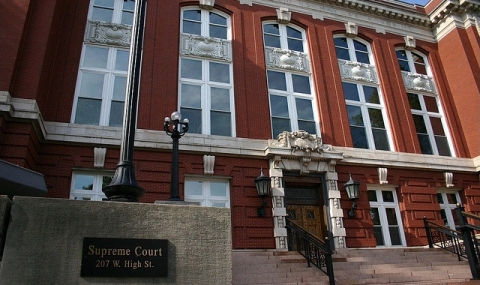The BBB's Warning to St. Louis Consumers
When Others First, a Michigan charity, mailed solicitations for car donations to St. Louis consumers, the St. Louis Better Business Bureau (BBB) investigated and posted a News Warning (Warning) on its website. The Warning urged caution when dealing with the charity because of its association with Rick Frazier, a for-profit fundraiser identified in some documents as the charity's "founder" and who had been "criticized for alleged improprieties in running similar programs." The Warning also noted a possible conflict of interest on the part of Maurice Banks, an officer of the charity who resigned shortly before obtaining his own lucrative for-profit contract with the charity.
The Michigan Lawsuit / Lack of Personal Jurisdiction
When the BBB refused to take down the Warning, the charity sued the BBB for defamation and tortious interference with the plaintiff's charitable endeavors in Michigan. The charity claimed the Warning falsely identified Frazier as its founder, falsely claimed that Banks had a conflict of interest, and that the BBB issued the Warning to benefit a competing BBB member charity.
The BBB moved to dismiss, claiming the Michigan court did not have personal jurisdiction over it. In response, the charity claimed the BBB could be sued in Michigan based on the charity's Michigan headquarters, the BBB's phone calls and e-mails to Michigan, the publication of the Warning on the internet, and the BBB's use of Search Engine Optimization (SEO) to ensure prominence of the Warning in internet searches.
The District Court granted the BBB's motion and dismissed the case. Others First, Inc. v. The Better Business Bureau of Eastern Missouri and Southern Illinois, 2014 WL 6455682, 2:14-cv-12066-GCS-PJK (E.D. Mich Nov. 17, 2014). The Court held that simply posting something on a website that damages a Michigan resident, even if Michigan residency is known, is insufficient. Although the Warning was about a Michigan company, the Court noted that the primary focus of the Warning was to warn consumers in St. Louis, and the BBB's emails and phone calls to Michigan were for investigative purposes and not seeking to do any business in Michigan. The Court also found that if the charity felt aggrieved by criticism in other places where it does business, it should sue there.
Finding personal jurisdiction lacking, the Court dismissed the action without prejudice.
The Missouri Federal Court Rejects the Suit on Its Merits
Within weeks of losing the jurisdiction battle in Michigan, the charity refiled a nearly identical lawsuit in a St. Louis. The BBB quickly moved for summary judgment, presenting documents and affidavits supporting the factual statements in the Warning, and contending that the statements advising caution and suggesting possible conflicts of interests were protected opinion based on truthfully disclosed facts.
The charity responded with its own affidavits, denying the substance of the previously published criticism about Frazier and disputing statements that he had "ties" to the charity, but never refuting the existence of such reports. It also disputed the claim of a conflict of interest between the charity and its since-retired officer, Banks, but did not refute the factual basis for the statement. The charity also claimed a need for discovery to determine whether the BBB issued the Warning with impure motives and to benefit a member charity, as speculated in its complaint and opposing affidavits.
After reviewing all of the briefing and evidence, the Court granted summary judgment for the BBB. Others First, Inc. v. The Better Business Bureau of Greater St. Louis, Inc., 105 F.Supp.2d 923 (E.D. Mo. 2015). The Court found, "it is indisputably true that Frazier has been criticized for alleged improprieties in running similar programs. That [the charity] does not like the fact that the BBB chose to inform readers that Frazier has been accused by others of improprieties while running other charitable donation programs does not render the statement false or defamatory." The Court also held that statements referencing Frazier's "ties" to the charity were neither false nor defamatory, given the indisputable fact that the charity had hired Frazier to run its program. Moreover, the Warning did not state that Frazier was the charity's "founder." It merely said "that he was described as such (albeit 'erroneously') in one of its own press releases."
Regarding the thrust of the Warning—that consumers should exercise caution before dealing with the charity—the Court held, "No reasonable fact-finder could conclude that an expression of caution conveys anything other than an opinion" based on accurately recited facts. The same was true for the conflict of interest statement. The Court "conclude[d] that no reasonable fact-finder could ever find that the BBB stated anything other than the truth and its seemingly well-informed opinions about [the charity]." Even though the charity spent a "great deal of time and effort in decrying the BBB's motives in publishing the release," the Court held that statements of opinion are protected "even if made maliciously or insincerely." Finally, because the sole basis for the tortious interference claim was the non-defamatory Warning, the Court held that claim failed as well.
The Eighth Circuit Court of Appeals Affirms
Unwilling to concede despite its two trial court defeats, the charity appealed, but with no more success. On July 12, 2016, the U.S. Court of Appeals affirmed the District Court's summary judgment. Others First, Inc. v. Better Business Bureau of Greater St. Louis, Inc., No. 15-2184 (July 12, 2016).
The Court agreed with the District Court that statements in the Warning were protected opinion based on disclosed facts, all of which were shown truthful in the BBB's summary judgment submissions, and none of which were adequately refuted in the charity's response. As such, any injurious falsehood or defamation claim failed.
The Court also agreed that the BBB had a legitimate interest in warning consumers of business practices it found questionable. Accordingly, because the charity provided no evidence of any wrongful action on the part of the BBB, other than the non-defamatory Warning, the charity's tortious interference claim failed. The Court concluded, "The district court properly granted summary judgment dismissing Others First's claim of injurious falsehood because all the challenged statements were either true statements of fact or protected opinion, and properly granted summary judgment dismissing the tortious interference claim given the absence of wrongful defamation."
Practice Pointer
Many cases like this are filed principally for one reason—to stifle free expression and stop criticism. The expense in defending such lawsuits, even when the lawsuit is bound to fail, warrants a quick and aggressive defense, which, though expensive initially, often results in considerable savings in the long run, both in money and the business disruptions that can result from prolonged discovery proceedings. At least some federal courts have countenanced such summary action. See, e.g., Farah v. Esquire Magazine, 736 F.3d 528, 534 (D.C. Cir. 2013) ("Summary proceedings are essential in the First Amendment area because if a suit entails 'long and expensive litigation,' then the protective purpose of the First Amendment is thwarted even if the defendant ultimately prevails."). Similarly, many states have enacted anti-SLAPP (Strategic Lawsuits Against Public Participation) statutes that require a plaintiff to support defamation claims promptly based on facts, not speculation, and that permit a defendant to secure early resolution if a plaintiff's claims lack merit, with the potential of the defendant's recovering its expenses and attorneys' fees. Missouri does not have such a statute, but that should not prevent a defendant from moving quickly where lawsuits are brought that have dubious merit.
Joseph E. Martineau, a member of Lewis Rice LLC in St. Louis, Missouri, represented the BBB in both the Michigan and Missouri lawsuits. Robin Luce-Hermann, a member of Butzel Long in Detroit, Michigan, was local counsel for the St. Louis BBB in Michigan.










